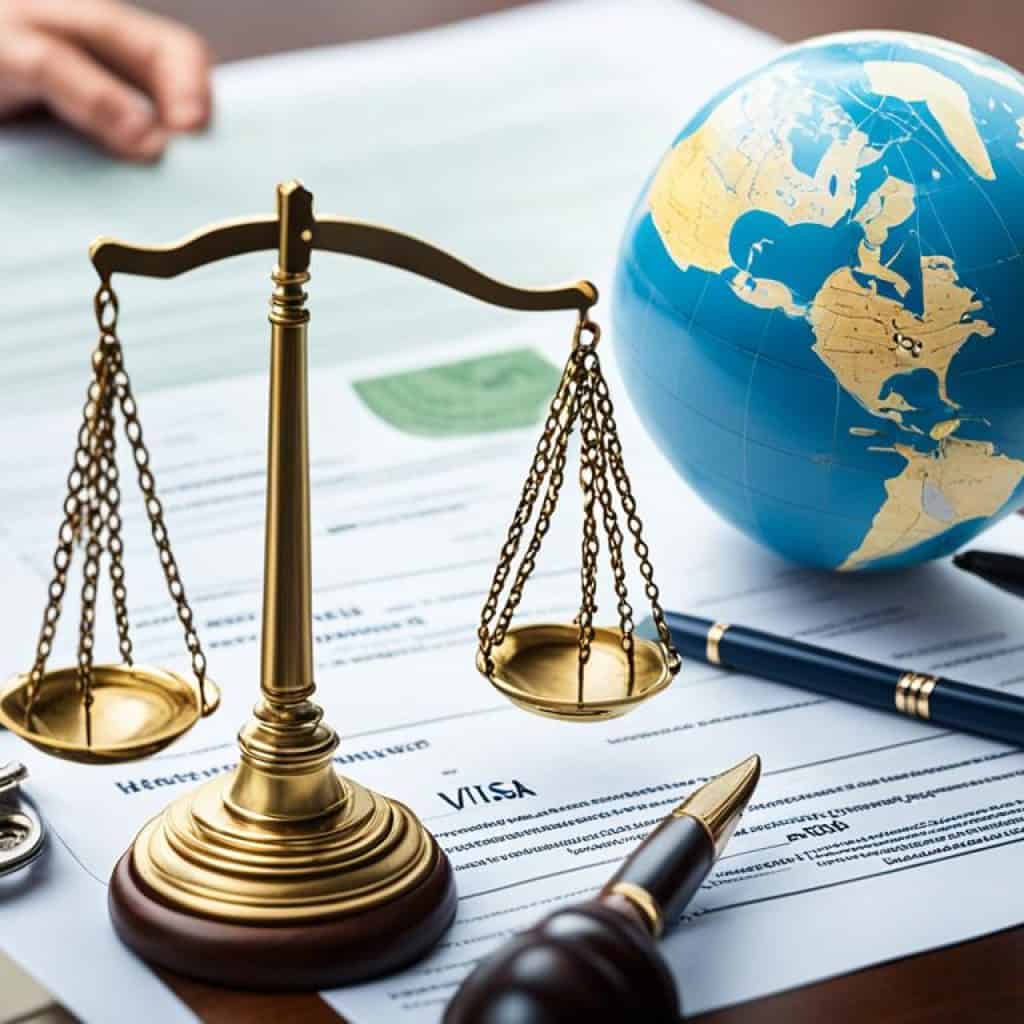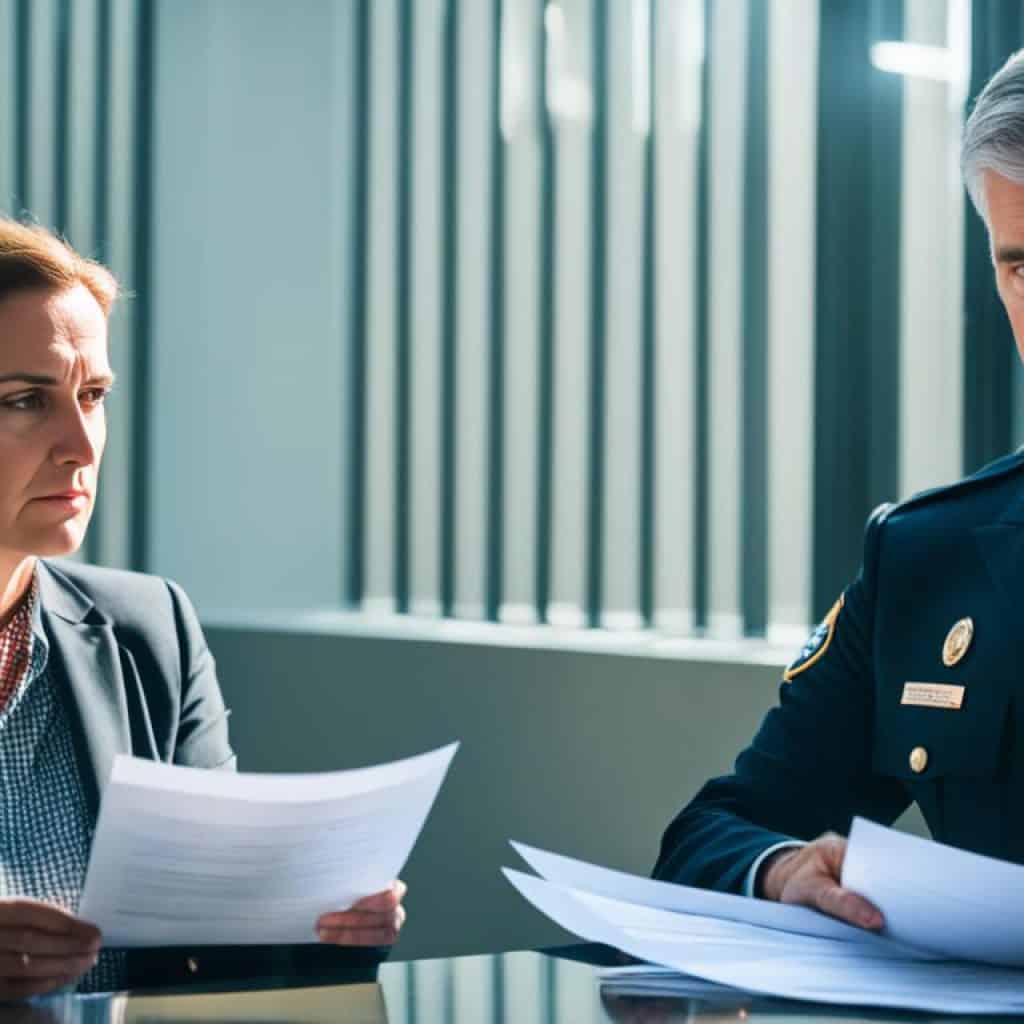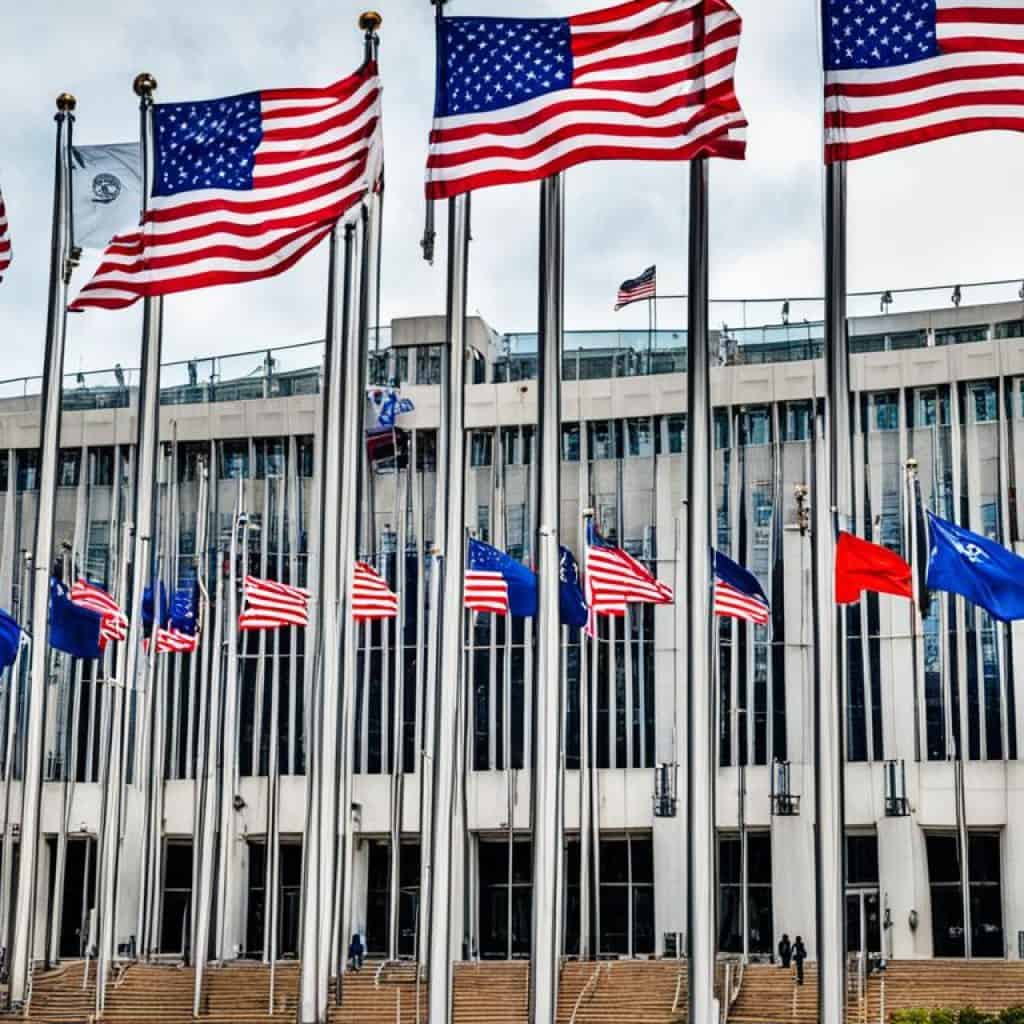Are you planning to bring your foreign-citizen fiancé(e) to the United States to start your lives together? The K1 visa can make that dream a reality. But how exactly does the K1 visa process work? What are the requirements, costs, and timeline?
In this comprehensive guide, we will walk you through the entire K1 visa process, from filing the petition to applying for the visa and providing the necessary documentation. We will cover everything you need to know to successfully navigate this complex journey and unite with your fiancé(e) in the USA.
Key Takeaways:
- Understand the K1 visa process for bringing your foreign-citizen fiancé(e) to the United States.
- Learn about the requirements, timeline, and costs involved in obtaining a K1 visa.
- Discover the necessary documentation and forms needed for the K1 visa application.
- Find out about the interview and medical examination requirements.
- Explore the rights, protections, and opportunities available to K1 visa holders.
Overview: What is a K-1 Visa?
A K-1 Visa is a nonimmigrant visa that allows the foreign-citizen fiancé(e) of a U.S. citizen to enter the United States to marry their U.S. citizen sponsor. This visa provides a pathway for couples to be together in the U.S. and start their married life. It is a temporary visa, valid for 90 days, during which time the couple must get married.
Once the foreign-citizen spouse and the U.S. citizen sponsor are married within the 90-day period, the foreign-citizen spouse can then apply for adjustment of status to become a permanent resident. This process allows the foreign-citizen spouse to remain in the U.S. and enjoy the same rights and benefits as other permanent residents.
“The K-1 Visa is designed to bring together couples who are engaged to be married, allowing them to start their life together in the United States.”
The K-1 Visa process recognizes the unique circumstances of fiancé(e)s by providing a legal avenue for them to reunite and build a future as spouses. It offers an opportunity for couples to navigate the immigration system and fulfill their dreams of living and building a life together in the United States.
Let’s take a closer look at the various steps involved in the K-1 Visa process and the requirements that couples must fulfill to make their union a reality.
What Is a “Fiancé(e)”?
Under U.S. immigration law, a fiancé(e) is the recipient of an approved Petition for Alien Fiancé(e), who has been issued a nonimmigrant K-1 visa for travel to the United States in order to marry their U.S. citizen fiancé(e). The couple must have met in person within the past two years and must be legally free to marry according to the laws of the U.S. state where the marriage will take place.
The International Marriage Broker Regulation Act of 2005 (IMBRA)
The International Marriage Broker Regulation Act (IMBRA) is a federal law that aims to protect the rights and safety of individuals participating in international marriage broker services. IMBRA requires specific disclosures and background checks to be performed for K-1 visa applicants who met their fiancé(e) through an international marriage broker.
Under IMBRA, U.S. citizens who have used the services of an international marriage broker are required to disclose certain information about themselves, including their criminal and marital history. The law also mandates that the international marriage broker provide the foreign fiancé(e) with important details concerning the petitioner’s past criminal and domestic violence records, if any.
IMBRA was enacted to address concerns regarding potential abuse and exploitation in the context of international marriages. By providing these disclosures and conducting background checks, the U.S. government aims to ensure the safety and well-being of foreign nationals who come to the United States on a K-1 visa.
IMBRA is an essential component of the K-1 visa process, as it protects both U.S. citizens and foreign fiancé(e)s from potential risks and ensures transparency in the matchmaking industry.
It is important for K-1 visa applicants to familiarize themselves with the IMBRA requirements and understand their rights in the process. The U.S. Department of State provides detailed instructions regarding IMBRA and its implications in the Form I-129F instructions.
IMBRA Requirements
| IMBRA Requirement | Description |
|---|---|
| Disclosure of Criminal History | U.S. citizen petitioners must disclose any convictions for certain crimes, including domestic violence, sexual assault, child abuse, and stalking. |
| Marital History Disclosures | U.S. citizen petitioners must disclose if they have filed previous petitions for K-1 visas or spousal visas. |
| Disclosure of Past Court Orders | U.S. citizen petitioners must disclose if they have a history of violating certain court orders, such as protection orders or restraining orders. |
| Information on Legal Rights | International marriage brokers must provide foreign fiancé(e)s with information about their legal rights and resources available to them in the United States. |
By complying with IMBRA requirements, both U.S. citizens and foreign fiancé(e)s can ensure a safer and more transparent K-1 visa process.

Next, we will explore the first step in the K-1 visa process: filing the petition with the U.S. Citizenship and Immigration Services (USCIS).
The First Step: Filing the Petition
The first step in the K1 visa process is for the U.S. citizen sponsor to file Form I-129F, Petition for Alien Fiancé(e), with the U.S. Citizenship and Immigration Services (USCIS). This form serves as a request to allow the foreign-citizen fiancé(e) to enter the United States and get married to their U.S. citizen sponsor.
When filing the petition, the U.S. citizen sponsor needs to provide evidence that both parties are legally free to marry, and they must plan to marry within 90 days of the foreign national’s arrival in the U.S. This demonstrates their genuine intention to enter into a valid marriage.
During the petition review process, USCIS will perform thorough background checks on both the U.S. citizen sponsor and the foreign-citizen fiancé(e). These checks ensure the safety and security of the U.S. and its citizens. The petitioner should be prepared to provide supporting documents and answer any questions that USCIS may have.
Once the petition is approved, it serves as the first step in the journey towards obtaining the K1 visa and bringing your fiancé(e) to the United States to start your life together.
| Benefits of Filing the Petition: | Considerations When Filing: |
|---|---|
|
|
Frequently Asked Questions:
Q: Is there a fee to file Form I-129F?
A: Yes, there is a filing fee associated with Form I-129F. As of 2021, the current fee is $535. The fee is subject to change, so it’s essential to check the latest fee information on the USCIS website.
Q: Can I file the petition electronically?
A: No, Form I-129F cannot be filed electronically at this time. You must mail the completed form and supporting documents to the appropriate USCIS lockbox facility.
Q: How long does it take for USCIS to process the petition?
A: The processing time for Form I-129F can vary depending on several factors. On average, it takes approximately 5 to 7 months for USCIS to review and approve the petition. However, processing times can be longer or shorter depending on the workload and other factors specific to your case.
Once the petition is approved by USCIS, it will be forwarded to the National Visa Center (NVC) for further processing. The NVC will then notify the foreign-citizen fiancé(e) and provide instructions on how to proceed with the next steps in the K1 visa application process.
The Second Step: Applying for a Visa
Once the petition is approved by USCIS, it is forwarded to the National Visa Center (NVC) for further processing. The NVC assigns a unique case number to the foreign-citizen fiancé(e) and transfers the petition to the U.S. Embassy or Consulate where the visa interview will take place. This is a crucial step in obtaining the K-1 visa.
Before the actual visa application, the NVC will notify the U.S. citizen petitioner when it is time for the foreign fiancé(e) to apply for the visa. This communication is essential to ensure that both parties are ready for the next phase of the process.
The fiancé(e) must complete Form DS-160, the Online Nonimmigrant Visa Application, and submit it electronically. This application collects personal information and background details necessary for the visa interview. It is important to provide accurate and truthful information to avoid any delays or complications.
After completing and submitting Form DS-160, the applicant must schedule a visa interview at the U.S. Embassy or Consulate. The interview process allows the consular officer to assess the eligibility and credibility of the applicant. It is an opportunity for the couple to demonstrate their genuine relationship and intentions to marry within the required timeframe.
Visa Interview Preparation
Preparing for the visa interview is crucial to ensure a smooth and successful process. It is essential to gather all the required documents and evidence to support the relationship and marriage plans. Some key documents to remember include:
- Valid passport
- Proof of the U.S. citizen petitioner’s citizenship
- Evidence of the petitioner and fiancé(e)’s genuine relationship, such as photographs, communication records, and joint financial documents
- Medical examination records
- Police certificates
The consular officer may request additional documents specific to the embassy or consulate where the interview will be conducted. It is advisable to review the embassy or consulate’s website thoroughly to understand their requirements and guidelines.
Remember, the visa interview is a crucial step in the K-1 visa process. Be well-prepared, stay confident, and provide honest and compelling answers to the consular officer’s questions.
Sample Table: K-1 Visa Interview Documentation Checklist
| Document | Description |
|---|---|
| Passport | A valid passport with a minimum validity of six months beyond the intended entry date into the United States. |
| Birth Certificate | Proof of the fiancé(e)’s date and place of birth. |
| Proof of U.S. Citizen Petitioner’s Citizenship | Evidence of the U.S. citizen petitioner’s citizenship, such as a birth certificate, Certificate of Naturalization, or Certificate of Citizenship. |
| Evidence of Relationship | Documents substantiating the genuineness of the relationship, including photographs, communication records, joint financial documents, and evidence of visits or shared travels. |
| Form DS-160 Confirmation Page | The printed confirmation page of the completed Form DS-160, which contains the applicant’s photo and barcode. |
| Medical Examination Records | Documentation confirming that the fiancé(e) has undergone the required medical examination by an authorized panel physician. |
| Police Certificates | Certificates from all countries where the fiancé(e) has resided for at least six months since turning 16. |
| Additional Documents | Any additional documents requested by the specific U.S. Embassy or Consulate where the interview will be held. |
Remember, it is essential to bring both original documents and clear copies of each document to the visa interview.

Required Documentation
In order to apply for a K-2 visa, both the fiancé(e) and eligible children must provide certain documents during the visa interview. These documents are essential for the application process and help establish the validity of the relationship. The following is a list of the required documentation:
1. Form DS-160
Applicants must complete and submit Form DS-160, which is the Online Nonimmigrant Visa Application. This form collects personal information and details about the purpose of the visit to the United States.
2. Passport
All applicants must possess a valid passport that is machine-readable or an e-passport. The passport should have a validity period that extends beyond the intended stay in the United States.
3. Birth Certificate
A copy of the birth certificate for the fiancé(e) and eligible children must be provided. This document confirms their identity and date of birth.
4. Divorce Certificate
If either the fiancé(e) or the U.S. citizen sponsor has been previously married, a divorce certificate or death certificate of the previous spouse must be presented to establish legal termination of the previous marriage.
5. Police Certificates
Applicants above a certain age (varies by country) must submit police certificates from each country they have resided in for six months or more since age 16. These certificates help ensure the applicant does not have a criminal history.
6. Medical Examination
A complete medical examination by an authorized panel physician is required for all fiancé(e) and eligible children. This examination ensures that the applicants are in good health and free from any communicable diseases that pose a risk to public health.
7. Evidence of Financial Support
Applicants must provide evidence that they will not become a public charge in the United States. This may include documents such as bank statements, employment letters, or an Affidavit of Support from the U.S. citizen sponsor.
8. Photographs
Recent passport-style color photographs of the fiancé(e) and eligible children should be provided. The photographs must meet the specifications outlined by the U.S. Embassy or Consulate where the interview will take place.
“Providing the required documentation is crucial for a successful K-2 visa application. Make sure to gather all the necessary documents and comply with the instructions provided by the U.S. Embassy or Consulate for a smooth visa interview process.”
By submitting these documents, the fiancé(e) and eligible children can demonstrate their eligibility and establish a genuine relationship with their U.S. citizen sponsor.
Review Additional U.S. Embassy/Consulate-Specific Instructions
When applying for a K-1 visa, it is crucial to review the additional instructions and requirements provided by the U.S. Embassy or Consulate where the visa interview will take place. Each embassy or consulate may have specific instructions tailored to their location, and it is essential to follow these guidelines to ensure a smooth application process.
The U.S. Embassy or Consulate-specific instructions may include:
- Additional document requirements:
- Information about the interview process:
- Specific appointment scheduling procedures:
- Location-specific guidelines:
By carefully reviewing and following these U.S. Embassy or Consulate-specific instructions, applicants can avoid unnecessary delays or complications during their K-1 visa application process.

Example: U.S. Embassy/Consulate-Specific Instructions
| U.S. Embassy/Consulate | Additional Instructions |
|---|---|
| U.S. Embassy in London | Applicants must submit certified translated copies of all documents not in English or Welsh. |
| U.S. Embassy in Delhi | Applicants are required to complete a medical examination at an authorized panel physician. |
| U.S. Consulate in Sydney | Applicants must provide a police certificate from each country where they have lived for more than 12 months since the age of 16. |
It is crucial to carefully review and follow the U.S. Embassy or Consulate-specific instructions to ensure a successful K-1 visa application process.
Medical Examination and Vaccination Requirements
Before your K-1 visa can be issued, you and any eligible children must undergo a medical examination. This examination is a requirement set by U.S. immigration law and must be performed by an authorized panel physician.
The medical examination serves two purposes: to assess your overall health and to ensure compliance with vaccination requirements. During the examination, the panel physician will conduct a thorough physical examination and review your medical history.
If you or your children have not received all the required vaccinations, they may be administered during the medical examination. The specific vaccinations required will depend on your age and medical condition.
The U.S. Embassy or Consulate will provide you with instructions on where to go for the medical examination and vaccinations. It is important to follow these instructions carefully and complete the medical examination before your scheduled visa interview.
To give you an idea of what to expect, here is an overview of the medical examination process:
| Medical Examination Process | Estimated Cost |
|---|---|
| Scheduling an appointment with an authorized panel physician | Varies by country |
| Physical examination, including a review of medical history | |
| Tuberculosis (TB) test, if required | |
| Blood tests, including tests for syphilis and HIV | |
| Chest X-ray, if required | |
| Vaccinations, if necessary | Cost of vaccines |
| Completing and sealing Form DS-3025, Vaccination Documentation Worksheet |
It is important to note that the cost of the medical examination and vaccinations may vary by country and the specific requirements of the panel physician. Be sure to budget for these costs when planning your visa application process.
Once the medical examination is completed, the panel physician will provide you with a sealed envelope containing the results. Do not open this envelope. Bring it with you to your visa interview, as the consular officer will need to review it.
Proof of Financial Support and Affidavit of Support Forms
One of the important requirements for a fiancé(e) visa applicant is to provide proof of financial support during the visa interview. This is to ensure that the foreign-citizen fiancé(e) will not become a public charge in the United States and that there is sufficient financial support for their stay. The U.S. citizen sponsor must demonstrate their ability to financially support their fiancé(e) while they are in the country.
There are two main forms that can be used to provide evidence of financial support:
Form I-134: Affidavit of Support
Form I-134 is a declaration of financial responsibility that is submitted by the U.S. citizen sponsor. It shows that the sponsor has enough income and assets to support their fiancé(e) during their visit and that they are willing to take financial responsibility for their fiancé(e) if necessary. This form is typically used when the U.S. citizen sponsor’s income does not meet the minimum requirements for using Form I-864.
Form I-864: Affidavit of Support
Form I-864 is a legally binding contract that is submitted by the U.S. citizen sponsor. It is used to demonstrate that the sponsor has enough income to support their fiancé(e) and that they will financially support them if necessary. This form is typically used when the U.S. citizen sponsor’s income meets or exceeds the minimum requirements set by the U.S. Department of Homeland Security.
The specific form required depends on the income requirements and the circumstances of the U.S. citizen sponsor. It’s important to consult with an immigration attorney or review the official instructions for each form to determine which one to use.
Additionally, after the marriage takes place, the U.S. citizen sponsor will need to submit Form I-864 to USCIS to support their foreign-citizen spouse’s application for adjustment of status, which allows them to become a permanent resident of the United States.
Fees – How Much Does a K Visa Cost?
When applying for a K-1 visa, there are various fees to consider. These fees cover different aspects of the visa application process and must be paid to the U.S. Department of State. Here is a breakdown of the costs:
Filing Fee for Form I-129F
The first fee to consider is the filing fee for Form I-129F, which is the Petition for Alien Fiancé(e). As of the current date, this fee is $535.
Nonimmigrant Visa Application Processing Fee (Form DS-160)
Another fee that applicants need to pay is the nonimmigrant visa application processing fee, which is required for the completion of Form DS-160. The current fee for this is $160.
Medical Examination Fee
Prior to the visa interview, the fiancé(e) and eligible children must undergo a medical examination. There is a fee associated with this examination, which varies depending on the authorized panel physician and the country where the examination takes place.
Other Related Costs
In addition to the above fees, there may be other related costs that applicants need to consider. These costs can include document translations, travel expenses to attend the visa interview, and any additional required documentation.
It is important to note that the fees mentioned here are subject to change, and it is advisable to check the latest fee schedule on the U.S. Department of State’s official website.
| Fee Type | Amount |
|---|---|
| Filing Fee for Form I-129F | $535 |
| Nonimmigrant Visa Application Processing Fee (Form DS-160) | $160 |
| Medical Examination Fee | Varies |
| Other Related Costs | Depends on specific circumstances |
It is essential that applicants budget and plan accordingly to meet the financial requirements of the K-1 visa process. Being aware of the costs involved will help ensure a smooth and successful journey towards obtaining the K visa.
Rights and Protections – Pamphlet
Visa applicants should read the Rights and Protections pamphlet before their visa interview to learn about their rights in the United States relating to domestic violence, sexual assault, and child abuse. The pamphlet provides information about the resources and support available to individuals in these situations.
“Knowing your rights is essential to protecting yourself and seeking help in difficult situations. The Rights and Protections pamphlet equips visa applicants with vital knowledge about their rights in the United States. It outlines the legal measures in place to safeguard individuals facing domestic violence, sexual assault, and child abuse. By familiarizing yourself with this information, you can make informed decisions, access appropriate support systems, and take necessary steps to ensure your safety and well-being.”
The Rights and Protections pamphlet provides a comprehensive overview of the rights and protections available to victims of domestic violence, sexual assault, and child abuse. It explains how to recognize and report abusive behaviors, the importance of seeking medical and legal assistance, and the role of law enforcement agencies and support organizations in providing help and resources.
Furthermore, the pamphlet includes contact information for various local and national organizations that specialize in supporting victims of domestic violence, sexual assault, and child abuse. These organizations offer counseling services, emergency shelter, legal assistance, and other crucial support systems.
It is essential to prioritize your safety and well-being. If you or someone you know is experiencing domestic violence, sexual assault, or child abuse, do not hesitate to seek support and assistance. The Rights and Protections pamphlet is a valuable resource that can empower individuals to break the cycle of abuse and establish a life free from violence and harm.
After You Receive a K-1 Fiancé(e) Visa
Once you have received your K-1 visa, it’s time to take the next steps towards starting your life in the United States with your U.S. citizen sponsor. Here’s what you need to know:
Marrying Your U.S. Citizen Sponsor
Upon entering the United States with your K-1 visa, you must marry your U.S. citizen sponsor within 90 days. This is a crucial requirement to maintain your lawful status in the country and proceed with the immigration process.
Adjustment of Status
After marriage, you can apply for adjustment of status to become a permanent resident. This process allows you to obtain a Green Card, which grants you the right to live and work permanently in the United States. It’s important to file the adjustment of status application as soon as possible after your marriage.
Social Security Number and Working in the United States
As a K-1 visa holder who has adjusted their status to a permanent resident, you are eligible to apply for a Social Security Number. This number is essential for various purposes, including employment, taxation, and accessing social benefits.
Once you have a Social Security Number, you have the right to work in the United States and enjoy the same employment opportunities as other U.S. citizens and permanent residents.
Traveling Outside the United States
Once your adjustment of status application is approved, you will become a permanent resident. As a permanent resident, you can travel outside the United States without jeopardizing your status. However, keep in mind that prolonged trips abroad may impact your eligibility for naturalization in the future.
| Benefits of Adjustment of Status | Responsibilities of Permanent Residents |
|---|---|
|
|
It’s important to understand that the adjustment of status process can be complex, and it’s recommended to consult an immigration attorney or seek guidance from a trusted resource to ensure the accuracy and completeness of your application.
Conclusion
The K1 Visa process is a vital pathway for foreign-citizen fiancé(e)s to reunite with their U.S. citizen partners and start their lives together in the United States. Although it can seem overwhelming, understanding the requirements and diligently following the step-by-step guide can lead to a successful outcome.
Throughout the process, it is crucial to gather and provide all the necessary documents, including Form I-129F, a valid passport, birth certificates, divorce certificates if applicable, police certificates, and medical examination records. Adhering to the timeline and ensuring financial support are also essential elements to consider.
By carefully preparing for the K1 visa interview and familiarizing oneself with the specific instructions provided by the U.S. Embassy or Consulate handling the application, couples can increase their chances of a smooth and successful process. Understanding the rights and protections available and the responsibilities that come with the visa is equally important to ensure a positive journey ahead.
With proper planning, patience, and attention to detail, couples can navigate the complexities of the K1 Visa process, fulfill the requirements, and embark on their journey towards a joyful and fulfilling marriage in the United States.
FAQ
What is a K-1 Visa?
A K-1 Visa is a nonimmigrant visa that allows the foreign-citizen fiancé(e) of a U.S. citizen to enter the United States to marry their U.S. citizen sponsor.
What is a “fiancé(e)”?
In the context of U.S. immigration law, a fiancé(e) refers to the recipient of an approved Petition for Alien Fiancé(e), who has been issued a nonimmigrant K-1 visa for travel to the United States in order to marry their U.S. citizen fiancé(e). The couple must have met in person within the past two years and must be legally free to marry according to the laws of the U.S. state where the marriage will take place.
What is the International Marriage Broker Regulation Act (IMBRA)?
The International Marriage Broker Regulation Act (IMBRA) is a federal law that regulates international marriage brokers. It requires certain disclosures and background checks to be performed for K-1 visa applicants. More information about IMBRA requirements can be found in the Form I-129F instructions.
What is the first step in the K1 visa process?
The first step in the K1 visa process is for the U.S. citizen sponsor to file Form I-129F, Petition for Alien Fiancé(e), with the U.S. Citizenship and Immigration Services (USCIS).
What is the second step in the K1 visa process?
The second step in the K1 visa process is for the foreign-citizen fiancé(e) to apply for the K-1 visa at the U.S. Embassy or Consulate.
What documents are required for the K-1 visa application?
The required documents for the K-1 visa application include a completed Form DS-160, passport, birth certificate, divorce or death certificates of any previous spouses, police certificates, a medical examination, evidence of financial support, and photographs. The consular officer may request additional information or documentation to prove the validity of the relationship.
Are there specific instructions for each U.S. Embassy or Consulate?
Yes, each U.S. Embassy or Consulate may have additional instructions or requirements for the K-1 visa application process. It is important to review the specific instructions provided by the embassy or consulate where the visa interview will take place.
What are the medical examination and vaccination requirements?
Before the K-1 visa can be issued, the fiancé(e) and eligible children must undergo a medical examination, which must be performed by an authorized panel physician. Vaccinations required under U.S. immigration law may also be administered during the medical examination. The U.S. Embassy or Consulate will provide instructions on where to get the medical examination and vaccinations.
What proof of financial support is required?
The fiancé(e) visa applicant must provide evidence of financial support during the visa interview. This may include Form I-134, Affidavit of Support, or Form I-864, Affidavit of Support, depending on the income requirements. The U.S. citizen sponsor will need to submit Form I-864 to USCIS after marriage to support the foreign-citizen spouse’s application for adjustment of status.
How much does a K-1 visa cost?
The total cost for a K-1 visa includes several fees, such as the filing fee for Form I-129F, the nonimmigrant visa application processing fee (Form DS-160), the medical examination fee, and other related costs such as document translations and travel expenses. The current cost of a K-1 visa is $800. The fees may vary depending on the country and specific circumstances.
What rights and protections are provided to K-1 visa holders?
Visa applicants should read the Rights and Protections pamphlet before their visa interview to learn about their rights in the United States relating to domestic violence, sexual assault, and child abuse. The pamphlet provides information about the resources and support available to individuals in these situations.
What happens after receiving a K-1 visa?
After receiving a K-1 visa, the fiancé(e) must enter the United States and marry their U.S. citizen sponsor within 90 days. After marriage, the foreign-citizen spouse can apply for adjustment of status to become a permanent resident. They can also apply for a Social Security Number and have the right to work in the United States. Once granted permanent residence, they can travel outside of the United States and enjoy the same rights as other permanent residents.
What is the overall process for obtaining a K-1 visa?
The K1 Visa process can be complex, but by following the step-by-step guide and providing the required documentation, couples can navigate the process successfully. It is important to be aware of the timeline and cost involved, as well as the rights and responsibilities that come with the visa. With proper preparation and adherence to the requirements, couples can start their married life in the United States.








Add comment